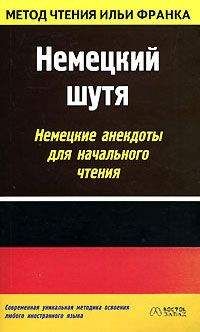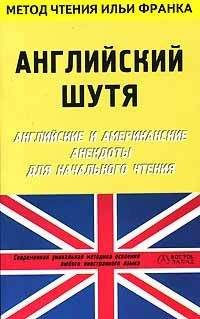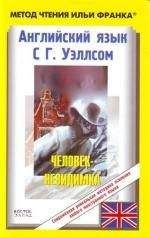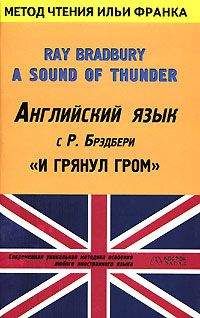Илья Франк - Английский шутя. Английские и американские анекдоты для начального чтения
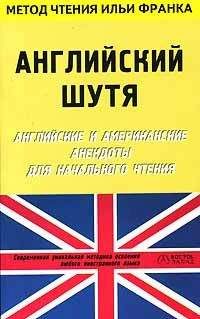
Помощь проекту
Английский шутя. Английские и американские анекдоты для начального чтения читать книгу онлайн
Three old men are sitting on the porch of a retirement home. The first says, "Fellas, I got real problems. I'm seventy years old. Every morning at seven o'clock I get up and I try to urinate. All day long I try to urinate. They give me all kinds of medicine but nothing helps."
The second old man says, "You think you have problems. I'm eighty years old. Every morning at 8:00 I get up and try to move my bowels. I try all day long. They give me all kinds of stuff but nothing helps."
Finally the third old man speaks up, "Fellas, I'm ninety years old. Every morning at 7:00 sharp I urinate. Every morning at 8:00 I move my bowels. Every morning at 9:00 sharp I wake up."
I got real problems.
They give me all kinds of medicine but nothing helps.
Every morning at 9:00 sharp I wake up.
A couple goes out to dinner to celebrate their 50th wedding anniversary (пара идет на ужин отметить свою пятидесятилетнюю годовщину свадьбы; anniversary [ǝnɪˈvǝ:(r)s(ǝ)rɪ]). On the way home, she notices a tear in his eye (по дороге домой она замечает слезу в его глазу) and asks if he's getting sentimental because they're celebrating 50 wonderful years together (и спрашивает, не потому ли он расчувствовался, что они отмечают 50 чудесных лет вместе).
He replies, "No, I was thinking about the time before we got married (нет, я думал о времени перед тем, как мы поженились). Your father threatened me with a shotgun (твой отец угрожал мне ружьем: to shoot /shot-shot/ - стрелять + gun — ружье) and said he'd have me thrown in jail for 50 years (и сказал, что он бросит меня в тюрьму на 50 лет /to throw-threw-thrown/) if I didn't marry you (если я не женюсь на тебе). Tomorrow I would've been a free man! (завтра я был бы свободным человеком)"
A couple goes out to dinner to celebrate their 50th wedding anniversary. On the way home, she notices a tear in his eye and asks if he's getting sentimental because they're celebrating 50 wonderful years together.
He replies, "No, I was thinking about the time before we got married. Your father threatened me with a shotgun and said he'd have me thrown in jail for 50 years if I didn't marry you. Tomorrow I would've been a free man!"
I was thinking about the time before we got married.
An elderly widow and widower were dating for about five years (пожилая вдова и вдовец встречались около пяти лет). The man finally decided to ask her to marry (мужчина наконец решил просить ее руки). She immediately said "yes" (она тут же сказала "да"; immediately [ɪˈmi:djǝtlɪ] - немедленно).
The next morning when he awoke (на следующее утро, когда он проснулся; to awake), he couldn't remember what her answer was! (он не мог припомнить, каков был ее ответ) "Was she happy? (она была счастлива = рада) I think so, wait, no, she looked at me funny… (кажется, подождите, нет, она смотрела на меня странно; fun — веселье, забава; funny — забавно; странно)"
After about an hour of trying to remember to no avail (после часа бесполезных попыток вспомнить; avail — польза [ǝˈveɪl]), he gave her a call (он позвонил ей). Embarrassed, he admitted that he didn't remember her answer to the marriage proposal (смущенный, он признался, что не помнит ее ответа на предложение; proposal [prǝˈpǝuz(ǝ)l]).
"Oh," she said, "I'm so glad you called (я так рада, что вы позвонили). I remembered saying 'yes' to someone, but I couldn't remember who it was (я помню, что сказала "да" кому-то, но я не могла вспомнить, кто это был)."
An elderly widow and widower were dating for about five years. The man finally decided to ask her to marry. She immediately said "yes".
The next morning when he awoke, he couldn't remember what her answer was! "Was she happy? I think so, wait, no, she looked at me funny…"
After about an hour of trying to remember to no avail, he gave her a call. Embarrassed, he admitted that he didn't remember her answer to the marriage proposal.
"Oh," she said, "I'm so glad you called. I remembered saying 'yes' to someone, but I couldn't remember who it was."
I'm so glad you called.
Two elderly couples were enjoying friendly conversation (две пожилые четы наслаждались дружеской беседой) when one of the men asked the other (когда один из мужчин спросил другого), "Fred, how was the memory clinic you went to last month? (ну и как "клиника памяти" — т.е.: восстановления памяти), в которую ты ходил в прошлом месяце)"
"Outstanding (замечательно; outstanding — выдающийся)," Fred replied. "They taught us all the latest psychological techniques — visualization, association — it made a huge difference for me (нас научили нас всем последним психологическим приемам: визуализации, ассоциации — это "сделало" огромную разницу для меня = это мне очень помогло; psychological [saɪkǝˈlɔdʒɪkǝl] techniques [tekˈni:ks])."
"That's great! What was the name of the clinic? (как называлась клиника)"
Fred went blank (был озадачен; blank — озадаченный, смущенный). He thought and thought, but couldn't remember (он думал и думал, но не мог вспомнить).
Then a smile broke across his face (затем улыбка появилась /to break — здесь: проступить/ на его лице) and he asked, "What do you call that flower with the long stem and thorns? (как ты называешь = как называется тот цветок, с длинным стеблем и шипами)"
"You mean a rose? (ты имеешь в виду розу)"
"Yes, that's it! (точно, вот именно: «это /есть/ оно»)"
He turned to his wife… (он повернулся к жене) "Rose, what was the name of that clinic? (Роза, как называлась та клиника)"
Two elderly couples were enjoying friendly conversation when one of the men asked the other, "Fred, how was the memory clinic you went to last month?"
"Outstanding," Fred replied. "They taught us all the latest psychological techniques — visulization, association — it made a huge difference for me."
"That's great! What was the name of the clinic?"
Fred went blank. He thought and thought, but couldn't remember. Then a smile broke across his face and he asked, "What do you call that flower with the long stem and thorns?"
"You mean a rose?"
"Yes, that's it!"
He turned to his wife… "Rose, what was the name of that clinic?"
It made a huge difference for me.
That's great!
Yes, that's it!
A little boy at a wedding looks at his mom and says (маленький мальчик на свадьбе смотрит на свою маму и говорит), "Mommy, why does the girl wear white? (мама, почему на девушке белое; to wear — носить)"
His mom replies, "The bride (невеста) is in white because she's happy (потому что она счастлива) and this is the happiest day of her life (и это самый счастливый день в ее жизни)."
The boy thinks about this (размышляет над этим), and then (затем) says, "Well then (ну, а тогда), why is the boy wearing black? (почему на молодом человеке черное)"
A little boy at a wedding looks at his mom and says, "Mommy, why does the girl wear white?"
His mom replies, "The bride is in white because she's happy and this is the happiest day of her life."
The boy thinks about this, and then says, "Well then, why is the boy wearing black?"
This is the happiest day of my life.
The newly wed wife (молодая жена: newly — недавно, только что; to wed — отдавать замуж; вступать в брак) said to her husband (сказала своему мужу) when he returned from work (когда он вернулся с работы), "I have great news for you (у меня для тебя потрясающая новость). Pretty soon (совсем скоро), we're going to be three in this house instead of two (нас будет трое в этом доме вместо двоих)."
Her husband ran to her (подбежал к ней /to run-ran-run/) with a smile on his face (с улыбкой на лице) and delight in his eyes (и восторгом в глазах).
He was glowing of happiness (он светился от счастья) and kissing his wife when she said (и целовал жену, когда она сказала), "I'm glad that you feel this way (я рада, что ты так это воспринял) since tomorrow morning (так как завтра утром) my mother moves in with us (моя мать переезжает к нам)."
The newly wed wife said to her husband when he returned from work, "I have great news for you. Pretty soon, we're going to be three in this house instead of two."
Her husband ran to her with a smile on his face and delight in his eyes. He was glowing of happiness and kissing his wife when she said, "I'm glad that you feel this way since tomorrow morning my mother moves in with us."
I have great news for you.
I'm glad that you feel this way.
A police officer in a small town (офицер полиции в маленьком городке) stopped a motorist who was speeding down Main Street (остановил автомобилиста, который слишком быстро ехал по главной улице).
"But, officer," the man began (начал /to begin-began-begun/), "I can explain… (я могу объяснить)"
"Just be quiet ("тихо")," snapped the officer (оборвал; to snap — щелкать, защелкиваться, хлопать; резко обрывать /кого-то/, обрывать /разговор/). "I'm going to let you cool your heels in jail (я собираюсь дать тебе "остудить твои пятки" в тюрьме, в камере) until the chief gets back (пока не вернется начальник)."
"But, officer, I just wanted to say… (но, офицер, я как раз хотел сказать)"
"And I said to keep quiet! (а я сказал, помолчи) You're going to jail! (ты отправляешься в тюрьму)"
A few hours later the officer looked in (несколько часов спустя офицер заглянул) on his prisoner (к своему заключенному; prison — тюрьма) and said, "Lucky for you ("удачно для тебя") that the chief's at his daughter's wedding (что начальник на свадьбе своей дочери). He'll be in a good mood when he gets back (он будет в хорошем настроении, когда вернется)."
"Don't count on it (не рассчитывай на это)," answered the fellow in the cell (ответил парень в камере). "I'm the groom (я жених)."
A police officer in a small town stopped a motorist who was speeding down Main Street.
"But, officer," the man began, "I can explain…"
"Just be quiet," snapped the officer. "I'm going to let you cool your heels in jail until the chief gets back."
"But, officer, I just wanted to say…"
"And I said to keep quiet! You're going to jail!"
A few hours later the officer looked in on his prisoner and said, "Lucky for you that the chief's at his daughter's wedding. He'll be in a good mood when he gets back."
"Don't count on it," answered the fellow in the cell. "I'm the groom."
Keep (be) quiet!
I just wanted to say…
Don't count on it.
There is an envelope (конверт; envelope [ˈǝnvɪlǝup]) on the windshield (на лобовом стекле: wind — ветер + shield — щит) with a note of apology (с извинительной запиской) and two tickets to a music concert (и двумя билетами на "музыкальный концерт"). The note reads (записка гласит), "I apologize for taking your car (я извиняюсь за "взятие" = за то, что взял вашу машину), but my wife was having a baby (но моя жена начала рожать) and I had to hot-wire your ignition (мне пришлось включить ваше зажигание; hot — горячий; wire — проволока; провод) to rush her to the hospital (чтобы примчать ее в госпиталь). Please forgive the inconvenience (пожалуйста, извините за неудобство; inconvenience [ɪnkǝnˈvɪnɪens]). Here are two tickets for tonight's concert of Garth Brooks (здесь два билета на сегодняшний вечерний концерт Гарта Брукса), the country-and-western music star (звезду стиля кантри-и-вестерн)."
